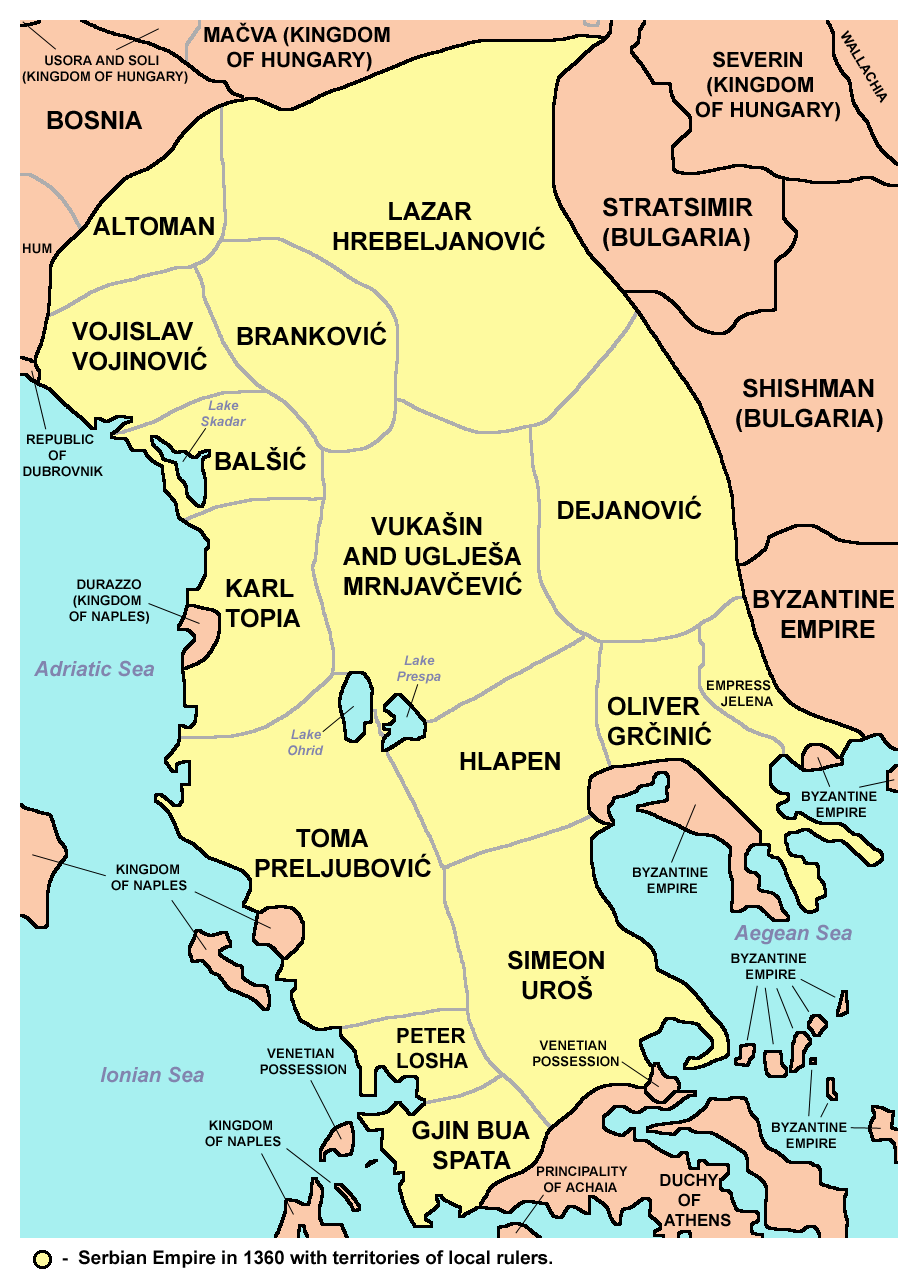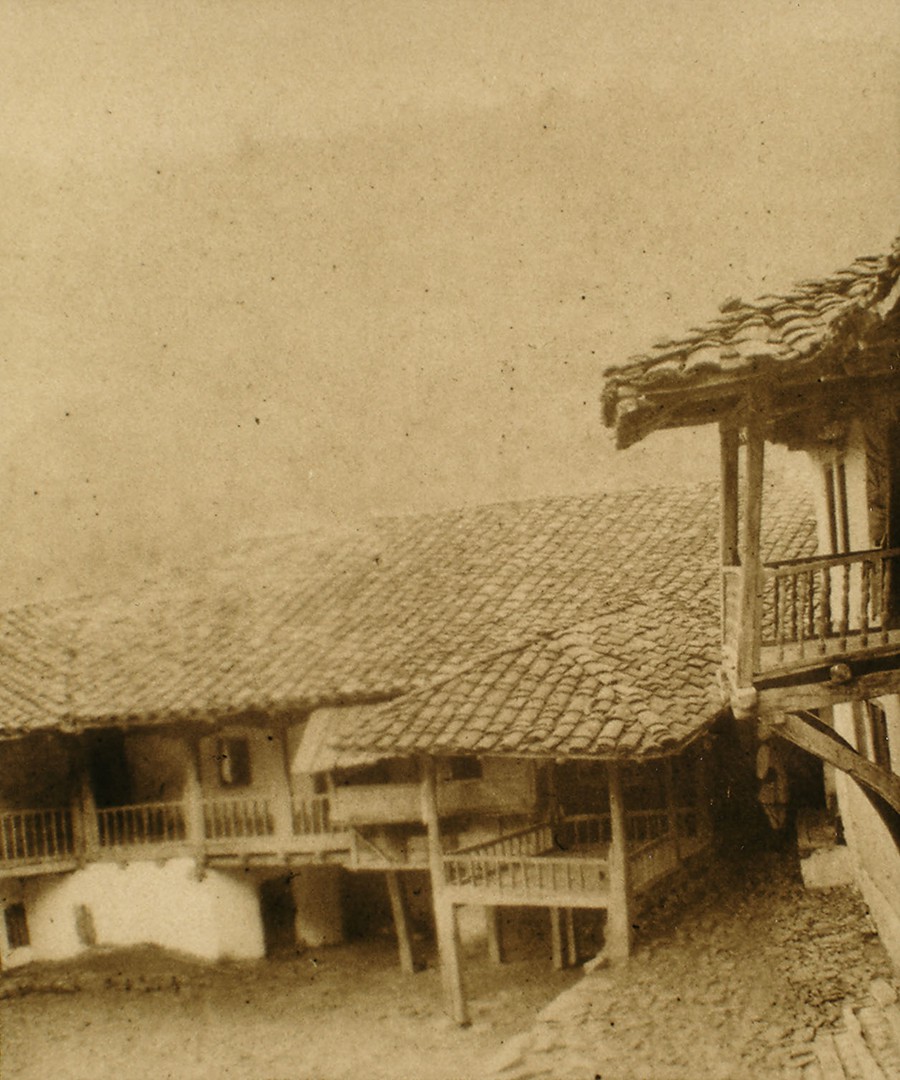Radoslav Hlapen on:
[Wikipedia]
[Google]
[Amazon]
Radoslav Hlapen (; 1350ŌĆō1383) was a Serbian magnate who served Serbian Emperor Stefan Du┼Īan (r. 1331ŌĆō1355) and Stefan Uro┼Ī V (r. 1355ŌĆō71) as '' vojvoda'' (military commander). He took part in the conquest of Byzantine lands, and was given a region north of
 In 1365, a '' ─Źelnik'' Radoslav was mentioned, referring either to Radoslav Hlapen or Radoslav Povika, the brother of '' logotet'' ─Éura─æ.
In 1365, a '' ─Źelnik'' Radoslav was mentioned, referring either to Radoslav Hlapen or Radoslav Povika, the brother of '' logotet'' ─Éura─æ.
 He married Irina (Irene) Nemanji─ć, the widow of ''caesar'' Preljub. They had the following issue:
*Maria Angelina Radoslava, married Alexios Angelos Philanthropenos
*Jelena, married Marko Mrnjav─Źevi─ć
*Unnamed, married Nikola Baga┼Ī
*Unnamed, married John Uro┼Ī
*Stefan
He married Irina (Irene) Nemanji─ć, the widow of ''caesar'' Preljub. They had the following issue:
*Maria Angelina Radoslava, married Alexios Angelos Philanthropenos
*Jelena, married Marko Mrnjav─Źevi─ć
*Unnamed, married Nikola Baga┼Ī
*Unnamed, married John Uro┼Ī
*Stefan
Thessaly
Thessaly ( ; ; ancient Aeolic Greek#Thessalian, Thessalian: , ) is a traditional geographic regions of Greece, geographic and modern administrative regions of Greece, administrative region of Greece, comprising most of the ancient Thessaly, a ...
to govern in the early 1350s.
Origin
It is believed that Radoslav Hlapen is the same person as '' ┼Šupan'' (count) Hlapen () who governed Konavle and the wider Trebinje region in the 1330s. He was possibly the son of ''┼Šupan'' Radoslav, and thus named Radoslav after his father. Another theory is that he was the son of Syrgiannes Palaiologos. Byzantine Emperor John VI Kantakouzenos (r. 1347ŌĆō54) mentioned him as among the most important nobles, and he was called a relative of Du┼Īan.Service under Stefan Du┼Īan
Serres was captured in September 1345, Veria in the first half of 1346. Veria and the surrounding towns were recuperated by John VI Kantakuzenos. After the military conquests, perhaps by spring 1351, Hlapen returned the city to Serbian rule, with many cities and towns in the area. He was appointed governor of Edessa (Voden) and Veria (Ber), just north ofThessaly
Thessaly ( ; ; ancient Aeolic Greek#Thessalian, Thessalian: , ) is a traditional geographic regions of Greece, geographic and modern administrative regions of Greece, administrative region of Greece, comprising most of the ancient Thessaly, a ...
.
Emperor Du┼Īan died in Devol, on 20 December 1355. Du┼Īan was succeeded by his son Stefan Uro┼Ī V.
Service under Stefan Uro┼Ī V
After the death of the governor of Thessaly '' kesar'' Preljub (1356), Preljub's son Thomas' claim to the region was asserted by the widow Irene. The Preljubovi─ć family was forced to flee to Serbia after the advance of Nikephoros II Orsini in 1356. Irene married Radoslav Hlapen, who adopted Thomas. ''Despot'' Simeon Uro┼Ī, the brother of Du┼Īan, was appointed governor ofEpirus
Epirus () is a Region#Geographical regions, geographical and historical region, historical region in southeastern Europe, now shared between Greece and Albania. It lies between the Pindus Mountains and the Ionian Sea, stretching from the Bay ...
and Acarnania in 1348. Following the death of Du┼Īan and subsequent invasion of Nikephoros II, Simeon Uro┼Ī retreated to Kastoria, where he proclaimed himself "Emperor of Serbs, Greeks and Albanians". Simeon Uro┼Ī acquired the support of John Komnenos Asen (the brother-in-law of Du┼Īan). In response, the Serbian nobility held a council in April 1357 at Skopje
Skopje ( , ; ; , sq-definite, Shkupi) is the capital and largest city of North Macedonia. It lies in the northern part of the country, in the Skopje Basin, Skopje Valley along the Vardar River, and is the political, economic, and cultura ...
, in which they vowed to support Emperor Uro┼Ī, according to Du┼Īan's will. In the summer of 1358, Simeon Uro┼Ī advanced on Zeta but was stopped at Skadar, where his army of 5,000 men was defeated by the Serbian nobility. Simeon Uro┼Ī returned to Kastoria, and never again tried to acquire Serbia. During the absence of Simeon Uro┼Ī in Epirus (1359), Hlapen invaded Thessaly on behalf of his stepson Thomas. Simeon Uro┼Ī was forced to cut his losses by recognizing Radoslav Hlapen's conquests, turning over Kastoria to him, and marrying his daughter Maria to Thomas. Hlapen continued to recognize Uro┼Ī' suzerainty, and provided a buffer between Uro┼Ī V and Simeon Uro┼Ī. After the treaty between Hlapen and Simeon Uro┼Ī, the latter settled in Thessaly.
 In 1365, a '' ─Źelnik'' Radoslav was mentioned, referring either to Radoslav Hlapen or Radoslav Povika, the brother of '' logotet'' ─Éura─æ.
In 1365, a '' ─Źelnik'' Radoslav was mentioned, referring either to Radoslav Hlapen or Radoslav Povika, the brother of '' logotet'' ─Éura─æ.
Fall of the Serbian Empire
After the Battle of Maritsa (1371) he became one of the most powerful provincial lords.Last years
He retired as a monk in the Vodo─Źa monastery where he also was buried. His votive ring was found at the site. He also founded a church in Ku─Źevi┼Īte,Skopje
Skopje ( , ; ; , sq-definite, Shkupi) is the capital and largest city of North Macedonia. It lies in the northern part of the country, in the Skopje Basin, Skopje Valley along the Vardar River, and is the political, economic, and cultura ...
, a monastery in Ostrovo, and a monastery in Greece.
Family
 He married Irina (Irene) Nemanji─ć, the widow of ''caesar'' Preljub. They had the following issue:
*Maria Angelina Radoslava, married Alexios Angelos Philanthropenos
*Jelena, married Marko Mrnjav─Źevi─ć
*Unnamed, married Nikola Baga┼Ī
*Unnamed, married John Uro┼Ī
*Stefan
He married Irina (Irene) Nemanji─ć, the widow of ''caesar'' Preljub. They had the following issue:
*Maria Angelina Radoslava, married Alexios Angelos Philanthropenos
*Jelena, married Marko Mrnjav─Źevi─ć
*Unnamed, married Nikola Baga┼Ī
*Unnamed, married John Uro┼Ī
*Stefan
Legacy
Mavro Orbini (1563ŌĆō1614) called him "primo barone di Grecia" (1601).See also
* Nobility of the Serbian EmpireReferences
Sources
;Books * * * * * * * * ;Journals * * * {{DEFAULTSORT:Hlapen, Radoslav Year of birth unknown 1380s deaths 14th-century Serbian nobility Medieval Serbian military leaders Medieval Macedonia People from the Serbian Empire Medieval Serbian magnates Generals of Stefan Du┼Īan Boyars of Stefan Du┼Īan